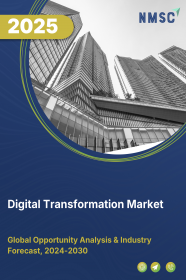
Digital Transformation Market by Offering (Solution and Service), by Deployment Mode (Cloud, On-Premise, and Others), by Organization Size (Large Enterprise and Small and Medium Enterprise (SME)), and by End User (BFSI, Retail & E-commerce, Government, Healthcare, IT & Telecom, Automotive, and Others) – Global Opportunity Analysis and Industry Forecast, 2024–2030
US Tariff Impact on Digital Transformation Market
Trump Tariffs Are Reshaping Global Business
Market Definition
The Digital Transformation Market size was valued at USD 1128.63 billion in 2023, and is predicted to reach USD 4907.10 billion by 2030, with a CAGR of 23.4% from 2024 to 2030. Digital transformation is the process of leveraging digital technologies to improve an organization's internal operations and customer experiences. This includes technologies such as cloud computing, big data analytics, artificial intelligence (AI), and the Internet of Things (IoT).
Digital technologies are used to create new products and services that cater to the needs of customers in new and innovative ways. This involves various tasks ranging from customer-facing interactions to back-office operations. It can reduce paper usage and energy consumption, creating a more sustainable operation model. This provides an opportunity to expand the reach and access to new markets with limited geographical restrictions. According to an analysis by Deloitte, the right combination of digital transformation can unlock as much as USD 1.25 trillion in additional market capitalization across all the Fortune 500 companies.
Market Dynamics and Trends
The increasing utilization of digitally-transformed services in the BFSI sector is driving the market growth. More people are moving toward the adoption of digital services in their lifestyles. For instance, in August 2023, Apple, Inc. launched Apple Pay in Vietnam with convenient direct payment services for consumers who own iPhones and Apple Watches. Banks such as Vietcom Bank, Techcombank, VPBank, and others allow users to directly link their bank's debit and credit card information into Apple Pay using Apple Wallet.
Also, the growing digital transformation in the automotive industries to provide a digitalized customer experience drives the market growth. For instance, in May 2022, Ducati Motor Holding collaborated with SAP SE to create a strong network of intelligent businesses by digitalizing various processes. This allows Ducati to combine technology and innovation with SAP’s expertise in machine learning (ML), Internet of Things (IoT), and advanced analytics for improved customer experience.
Moreover, the growing adoption of digital accessibility by the healthcare industry toward implementing AI and IoT on medical portfolios is creating a demand for the digital transformation market. For example, The Rockefeller Foundation and the United States Agency for International Development’s (USAID) Centre for Innovation and Impact (CII) partnered with the Bill and Melinda Gates Foundation to develop AI in the global health sector. It creates opportunities for donors, governments, investors, and other stakeholders to explore and make development toward cost-effective use of AI globally.
However, concerns regarding data breaches and cybersecurity ultimately impact the adoption of new digital tools and restrain the growth of the digital transformation market.
On the contrary, the integration of the latest technologies, such as 5G with AI, will further enable more connected devices to enter the digital platforms. This is expected to create significant opportunities for the market growth.
Market Segmentation and Scope of Study
The digital transformation market is segmented on the basis of offering, deployment mode, organization size, end user, and region. Based on offering, the market is categorized into solution and service. The solution segment is sub-divided into analytics, cloud computing, big data & analytics, blockchain, cybersecurity, AI, IoT, mobility, social media, and others. The service segment is further divided into professional services, implementation, and integration.
Based on deployment mode, the market is segmented into cloud and on-premise. On the basis of organization size, the market is divided into large enterprise and small and medium enterprise (SME). On the basis of end user, the market is classified into BFSI, retail & e-commerce, government, healthcare, IT & telecom, automotive, and others. The regional breakdown and analysis of each of the aforesaid segments includes regions, such as North America, Europe, Asia-Pacific, and the Rest of the World (RoW).
Geographical Analysis
North America dominates the digital transformation market. This is attributed to factors such as government initiatives toward the implementation of AI on the nation’s software infrastructure. For instance, in August 2023, the U.S. government launched a major two-year competition that focuses on the use of AI to protect the country’s most important software, such as programs that help run the internet and critical infrastructure.
This is executed to identify and fix software vulnerabilities using AI led by the Defense Advanced Research Projects Agency (DARPA) in collaboration with top AI companies, including Google LLC, Microsoft Corporation, and OpenAI.
Also, growing developments in advanced AI chatbots toward digital mediums propel the market growth in developed nations, such as the U.S. and Canada. For instance, in March 2023, Google LLC launched BARD, an AI-powered chatbot that will compete with OpenAI and Microsoft in the chatbot market. It is developed under conversational AI service, which uses a Language Model for Dialogue Application (LaMDA) with large language models.
On the other hand, Asia-Pacific is considered the fastest-growing region, where the market is analyzed across India, China, Japan, and the rest of the APAC region. This is due to the expansion toward digital implementation across the region by renowned IT companies.
For instance, in June 2022, Tanla, a communication as a platform service (CPaaS) provider, collaborated with Kore.ai, Inc., an AI software and solution provider company. This collaboration aims to provide AI-based service in five countries, such as India, UAE, Indonesia, Vietnam, and the Philippines.
Furthermore, the growing development of AI-based solutions by prominent companies to enter the digital world is boosting the market growth. For instance, in May 2023, Infosys Limited launched Infosys Topaz, a platform that uses artificial intelligence (AI) to provide services and solutions to more businesses in the connected ecosystem. For example, a national railway company implemented Infosys Topaz to create a smart hub, forming agile value chains with market partners for functions, such as logistics.
Competitive Landscape
The digital transformation market includes several market players, including Alphabet LLC, Microsoft Corporation, Amazon Web Services, Inc., Apple Inc, IBM Corporation, SAP SE, Adobe Inc., Cisco Sytems, Inc., Alibaba Group Holding Limited, Accenture Plc, Mphasis, ScienceSoft, Golden Owl, LeewayHertz, Optimum Solutions, and others. These market players opt for various business strategies, such as collaboration and product launches, to maintain their dominance in the global digital transformation market.
For instance, in May 2023, SAP SE collaborated with IBM Corporation to implement IBM Watson technology into SAP solutions to provide digital assistance using new AI-driven insights and automation. The new AI helps users boost productivity with natural language capabilities and predictive insights across the industry. It offers new digital assistant capabilities across SAP solutions to help answer distinctive questions for managers and employees.
In March 2023, Adobe, Inc. introduced Firefly, a new family of creative and generative artificial intelligence (AI) models focusing on generating high-quality images and stunning text effects. Abode Firefly significantly enhances precision, power, and speed, integrating into Creative Cloud, Document Cloud, Experience Cloud, and Adobe Express, where it is required for content creation and modification.
Key Benefits
-
The report provides quantitative analysis and estimations of the digital transformation market from 2024 to 2030, which assists in identifying the prevailing market opportunities.
-
The study comprises a deep-dive analysis of the digital transformation market, including the current and future trends to depict prevalent investment pockets in the market.
-
Information related to key drivers, restraints, and opportunities and their impact on the digital transformation market is provided in the report.
-
Competitive analysis of the players, along with their market share is provided in the report.
-
SWOT analysis and Porters Five Forces model is elaborated in the study.
-
Value chain analysis in the market study provides a clear picture of roles of stakeholders.
Key Market Segments
By Offering
-
Solution
-
Cloud Computing
-
Big Data & Analytics
-
Blockchain
-
Cybersecurity
-
Artificial Intelligence (Al)
-
Internet of Things (loT)
-
Enterprise Resource Planning (ERP)
-
Robotic Process Automation(RPA)
-
Others
-
-
Service
-
Professional Services
-
Implementation and Integration
-
By Deployment Mode
-
Cloud
-
On-Premise
By Organization Size
-
Large Enterprise
-
Small and Medium Enterprise (SME)
By End-user
-
BFSI
-
Retail & E-commerce
-
Government
-
Healthcare
-
IT & Telecom
-
Automotive
-
Others
By Region
-
North America
-
The U.S.
-
Canada
-
Mexico
-
-
Europe
-
The UK
-
Germany
-
France
-
Italy
-
Spain
-
Denmark
-
Netherlands
-
Finland
-
Sweden
-
Norway
-
Russia
-
Rest of Europe
-
-
Asia Pacific
-
China
-
Japan
-
India
-
South Korea
-
Australia
-
Indonesia
-
Singapore
-
Taiwan
-
Thailand
-
Rest of Asia Pacific
-
-
RoW
-
Latin America
-
Middle East
-
Africa
-
Key Players
-
Alphabet LLC
-
Microsoft Corporation
-
Amazon Web Services, Inc.
-
Apple Inc
-
IBM Corporation
-
SAP SE
-
Adobe Inc.
-
Cisco Sytems, Inc.
-
Alibaba Group Holding Limited
-
Accenture Plc
-
Mphasis
-
ScienceSoft
-
Golden Owl
-
LeewayHertz
-
Optimum Solutions
REPORT SCOPE AND SEGMENTATION:
|
Parameters |
Details |
|
Market Size in 2023 |
USD 1128.63 Billion |
|
Revenue Forecast in 2030 |
USD 4907.10 Billion |
|
Growth Rate |
CAGR of 23.4% from 2024 to 2030 |
|
Analysis Period |
2023–2030 |
|
Base Year Considered |
2023 |
|
Forecast Period |
2024–2030 |
|
Market Size Estimation |
Billion (USD) |
|
Growth Factors |
Increasing utilization of digitally transformed services in the BFSI sector is driving the market growth. Growing digital transformation in automotive industry. Rising adoption of digital accessibility by healthcare industry. |
|
Countries Covered |
28 |
|
Companies Profiled |
15 |
|
Market Share |
Available for 10 companies |
|
Customization Scope |
Free customization (equivalent to up to 80 working hours of analysts) after purchase. Addition or alteration to country, regional, and segment scope. |
|
Pricing and Purchase Options |
Avail customized purchase options to meet your exact research needs. |

















 Speak to Our Analyst
Speak to Our Analyst




















